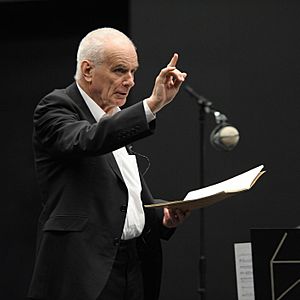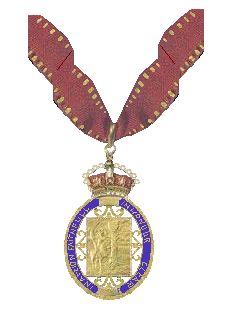Peter Maxwell Davies facts for kids
Quick facts for kids
Peter Maxwell Davies
|
|
|---|---|

Davies in 2012
|
|
| 20th Master of the Queen's Music | |
| In office 2004–2014 |
|
| Monarch | Elizabeth II |
| Preceded by | Malcolm Williamson |
| Succeeded by | Judith Weir |
| Personal details | |
| Born | 8 September 1934 Salford, Lancashire, England |
| Died | 14 March 2016 (aged 81) Sanday, Orkney, Scotland |
| Occupation |
|
| Known for | List of compositions |
Sir Peter Maxwell Davies (8 September 1934 – 14 March 2016) was a famous English composer and conductor. He was known for creating many different types of music. In 2004, he was given the special role of Master of the Queen's Music. This meant he was the official musician for the Queen.
When he was a student, Davies helped start a group called New Music Manchester. This group focused on new and modern music. He wrote many pieces for the stage, like Eight Songs for a Mad King, and ten symphonies. He also conducted many famous orchestras, like the Royal Philharmonic Orchestra.
Contents
Early Life and Learning Music
Peter Maxwell Davies was born in Salford, England. When he was just four years old, he saw a musical play called The Gondoliers. After that, he told his parents he wanted to be a composer.
He started taking piano lessons and writing music when he was very young. At 14, he sent a song called Blue Ice to a radio show. A BBC producer named Trevor Hill was very impressed. He helped Davies become the show's main composer. This was the start of his journey to becoming famous.
Davies studied music at the University of Manchester and the Royal Manchester College of Music. There, he met other students who also loved modern music. They formed the group New Music Manchester. After college, he continued his studies in Rome, Italy. Later, he taught music at a school and then studied at Princeton University in the United States. He also spent some time as a composer in Australia.
His Career as a Musician
Davies was known for his bold and new music in the 1960s. One of his well-known pieces was Eight Songs for a Mad King (1969). In this work, he used parts of famous music, like Handel's Messiah. He changed them to tell the story of King George III's struggles.
In 1966, Davies moved to the Orkney Islands in Scotland. He loved the islands and later started an arts festival there called the St Magnus Festival in 1977. He often used this festival to show his new music. Sometimes, local school orchestras would even play his pieces.
Davies was also a conductor for many years. He worked with the Royal Philharmonic Orchestra and the BBC Philharmonic Orchestra. He also conducted other big orchestras around the world. He wrote a series of ten Strathclyde Concertos for the Scottish Chamber Orchestra.
Davies was one of the first classical composers to have a music download website. It was called MaxOpus and started in 1996. He received many awards and honors for his music. In 1987, he was made a knight, so he became "Sir" Peter Maxwell Davies. In 2004, he was chosen to be the Master of the Queen's Music for ten years.
His Life and Interests
Friends and colleagues often called Peter Maxwell Davies "Max."
Davies was very interested in protecting the environment. He wrote a collection of songs called The Yellow Cake Revue. He performed these songs to protest plans to mine uranium in Orkney. A famous piece from this collection is Farewell to Stromness. This song describes people having to leave their homes because of pollution.
He also spoke out against the Iraq War in 2003. He marched in protests and often shared his views on politics.
When he was first chosen as Master of the Queen's Music, some people were surprised. This was because he had previously said he preferred a country without a king or queen. However, after meeting the Queen, he changed his mind. He said that the monarchy represented important things like stability and tradition.
Sir Peter Maxwell Davies passed away on 14 March 2016, at the age of 81. He was still writing music in his final months.
His Music
Davies wrote a lot of music in many different styles. He often mixed different styles in one piece. His early works sometimes used old musical methods from the Middle Ages and Renaissance. He would often use parts of old church songs as a starting point for his music.
Some of his music from the late 1960s was very experimental and strong. These pieces included Eight Songs for a Mad King and the opera Taverner. The orchestral piece St Thomas Wake (1969) is a good example of how he mixed styles. It combines dance music from the 1920s with older music and his own new sounds. Many of these works were performed by a group he started called the Pierrot Players, which later became the Fires of London.
After moving to Orkney, Davies often used themes from the islands in his music. He wrote several operas, including The Lighthouse (1980), which is one of his most popular.
Davies was also very interested in classical music forms. He wrote ten symphonies between 1973 and 2013. He also wrote a series of ten string quartets called the Naxos Quartets. He thought of these quartets as a "novel in ten chapters."
He also wrote lighter orchestral pieces like An Orkney Wedding, with Sunrise, which features bagpipes. He composed music for children's plays and for films. His last works, even when he was ill, showed his amazing creativity. He was working on a String Quartet when he died.
Career Highlights
- 1953–58 – Studied music in Manchester and Rome.
- 1967 – Co-founded the modern music group the Pierrot Players (later called The Fires of London).
- 1971 – Moved to the Hoy in the Orkney Islands.
- 1977 – Started the St Magnus Festival.
- 1987 – Was made a knight.
- 1987–96 – Wrote the ten Strathclyde Concertos for the Scottish Chamber Orchestra.
- 2001–07 – Wrote a series of ten string quartets.
- 2004 – Became Master of the Queen's Music.
- 2005 – Received an honorary music degree from Oxford University.
- 2008 – Became Patron of the Manchester University Music Society (MUMS).
- 2009 – Became an Honorary Fellow of Homerton College, Cambridge.
- 2014 – Was appointed to the Order of Companions of Honour.
- 2015 – Was given the Gold Medal of the Royal Philharmonic Society.
Selected Compositions
- First Taverner Fantasia (1962)
- Second Taverner Fantasia (1964)
- Revelation and Fall (1966)
- Worldes Blis (1966–69)
- St Thomas Wake (1969)
- Eight Songs for a Mad King (1968; for singer/narrator/actor and chamber ensemble)
- Missa super l'homme armé (1968, rev. 1971; for male or female speaker or singer and ensemble)
- Stone Litany (1973)
- Ave Maris Stella (1975; chamber ensemble)
- The Door of the Sun for Viola Solo, J.132 (1975)
- Symphony No. 1 (1973–76; orchestra)
- The Martyrdom of St Magnus (1977; chamber opera)
- The Lighthouse (1979; chamber opera)
- Black Pentecost (1979; for mezzo-soprano, baritone, & orchestra)
- Cinderella (1980; children's opera)
- Symphony No. 2 (1980)
- The Yellow Cake Review (1980), including Farewell to Stromness
- Image, Reflection, Shadow (1982; ensemble)
- Symphony No. 3 (1984)
- An Orkney Wedding, with Sunrise (1985; orchestra)
- Concerto for Violin and Orchestra (1985; dedicated to Isaac Stern who gave the first performance on 21 June 1986 at the St. Magnus Festival in the Orkney Islands)
- Concerto for Trumpet and Orchestra (1988)
- Symphony No. 4 (1989)
- Caroline Mathilde (1991; ballet)
- Strathclyde Concerto No. 3 for horn, trumpet, and symphony orchestra, (German Premiere: Markus Wittgens, horn / Otto Sauter, trumpet / Philharmonisches Staatsorchester Bremen / Conductor: Peter Maxwell Davies – Bremen) (1994)
- Strathclyde Concerto No. 5 for violin, viola, and string orchestra, J.245 (1991)
- A Spell for Green Corn: The MacDonald Dances (1993; violin, orchestra)
- Symphony No. 5 (1994)
- The Doctor of Myddfai (1996; opera)
- Symphony No. 6 (1996)
- Concerto for Piccolo and Orchestra (1996, opus 182)
- Job (1997; singers, orchestra)
- Mr Emmet Takes a Walk (2000; chamber opera)
- Symphony No. 7 (2000)
- Symphony No. 8 (Antarctic Symphony) (2001)
- Naxos Quartets (2001–2007; string quartet)
- Homerton (2010; for the choir of Homerton College, Cambridge)
- Kommilitonen! (2011; opera)
- Symphony No. 9 (2012)
- Symphony No. 10 (Alla ricerca di Borromini) (2013)
Recordings
- Naxos Quartets – Maggini Quartet – Naxos 5-CD set 8.505225
- Mass; Missa parvula; two organ pieces; two motets – Hyperion CDA67454
- Magnificat and Nunc Dimittis and O Sacrum Convivium – Delphian DCD34037
- Symphonies 1–6 – BBC Philharmonic, Scottish Chamber Orchestra, Philharmonia, Royal Philharmonic / composer – Collins Classics
- Ave Maris Stella; Image, Reflection, Shadow; Runes from a Holy Island – Fires of London / composer – Unicorn-Kanchana
See also
 In Spanish: Peter Maxwell Davies para niños
In Spanish: Peter Maxwell Davies para niños


